Fleurs du Mal Magazine


Or see the index
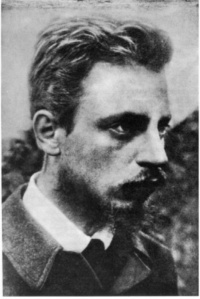
Rainer Maria Rilke
(1875 – 1926)
Gesang der Frauen an den Dichter
Sieh, wie sich alles auftut: so sind wir;
denn wir sind nichts als solche Seligkeit.
Was Blut und Dunkel war in einem Tier,
das wuchs in uns zur Seele an und schreit
als Seele weiter. Und es schreit nach dir.
Du freilich nimmst es nur in dein Gesicht,
als sei es Landschaft: sanft und ohne Gier.
Und darum meinen wir, du bist es nicht,
nach dem es schreit. Und doch, bist du nicht der,
an den wir uns ganz ohne Rest verlören?
Und werden wir in irgendeinem mehr?
Mit uns geht das Unendliche vorbei.
Du aber sei, du Mund, daß wir es hören,
du aber, du Uns-Sagender: du sei.
Rainer Maria Rilke Gedichte
fleursdumal.nl magazine
More in: Archive Q-R, Rilke, Rainer Maria
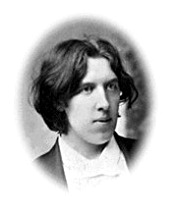 Oscar Wilde
Oscar Wilde
(1854 – 1900)
The Doer of Good
It was night-time and He was alone.
And He saw afar-off the walls of a round city and went towards the city.
And when He came near He heard within the city the tread of the feet of joy, and the laughter of the mouth of gladness and the loud noise of many lutes. And He knocked at the gate and certain of the gatekeepers opened to Him.
And He beheld a house that was of marble and had fair pillars of marble before it. The pillars were hung with garlands, and within and without there were torches of cedar. And He entered the house.
And when He had passed through the hall of chalcedony and the hall of jasper, and reached the long hall of feasting, He saw lying on a couch of sea-purple one whose hair was crowned with red roses and whose lips were red with wine.
And He went behind him and touched him on the shoulder and said to him, ‘Why do you live like this?’
And the young man turned round and recognised Him, and made answer and said, ‘But I was a leper once, and you healed me. How else should I live?’
And He passed out of the house and went again into the street.
And after a little while He saw one whose face and raiment were painted and whose feet were shod with pearls. And behind her came, slowly as a hunter, a young man who wore a cloak of two colours. Now the face of the woman was as the fair face of an idol, and the eyes of the young man were bright with lust.
And He followed swiftly and touched the hand of the young man and said to him, ‘Why do you look at this woman and in such wise?’
And the young man turned round and recognised Him and said, ‘But I was blind once, and you gave me sight. At what else should I look?’
And He ran forward and touched the painted raiment of the woman and said to her, ‘Is there no other way in which to walk save the way of sin?’
And the woman turned round and recognised Him, and laughed and said, ‘But you forgave me my sins, and the way is a pleasant way.
And He passed out of the city.
And when He had passed out of the city He saw seated by the roadside a young man who was weeping.
And He went towards him and touched the long locks of his hair and said to him, ‘Why are you weeping?’
And the young man looked up and recognised Him and made answer, ‘But I was dead once and you raised me from the dead. What else should I do but weep?’
Oscar Wilde, 1894
fleursdumal.nl magazine
More in: Archive W-X, Wilde, Oscar, Wilde, Oscar
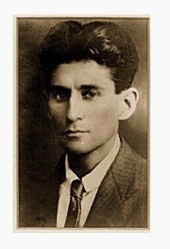 Franz Kafka
Franz Kafka
Das Schweigen der Sirenen
Beweis dessen, daß auch unzulängliche, ja kindische Mittel zur Rettung dienen können:
Um sich vor den Sirenen zu bewahren, stopfte sich Odysseus Wachs in die Ohren und ließ sich am Mast festschmieden. Ähnliches hätten natürlich seit jeher alle Reisenden tun können, außer denen, welche die Sirenen schon aus der Ferne verlockten, aber es war in der ganzen Welt bekannt, daß dies unmöglich helfen konnte. Der Sang der Sirenen durchdrang alles, und die Leidenschaft der Verführten hätte mehr als Ketten und Mast gesprengt. Daran aber dachte Odysseus nicht, obwohl er davon vielleicht gehört hatte. Er vertraute vollständig der Handvoll Wachs und dem Gebinde Ketten und in unschuldiger Freude über seine Mittelchen fuhr er den Sirenen entgegen.
Nun haben aber die Sirenen eine noch schrecklichere Waffe als den Gesang, nämlich ihr Schweigen. Es ist zwar nicht geschehen, aber vielleicht denkbar, daß sich jemand vor ihrem Gesang gerettet hätte, vor ihrem Schweigen gewiß nicht. Dem Gefühl, aus eigener Kraft sie besiegt zu haben, der daraus folgenden alles fortreißenden Überhebung kann nichts Irdisches widerstehen.
Und tatsächlich sangen, als Odysseus kam, die gewaltigen Sängerinnen nicht, sei es, daß sie glaubten, diesem Gegner könne nur noch das Schweigen beikommen, sei es, daß der Anblick der Glückseligkeit im Gesicht des Odysseus, der an nichts anderes als an Wachs und Ketten dachte, sie allen Gesang vergessen ließ.
Odysseus aber, um es so auszudrücken, hörte ihr Schweigen nicht, er glaubte, sie sängen, und nur er sei behütet, es zu hören. Flüchtig sah er zuerst die Wendungen ihrer Hälse, das tiefe Atmen, die tränenvollen Augen, den halb geöffneten Mund, glaubte aber, dies gehöre zu den Arien, die ungehört um ihn verklangen. Bald aber glitt alles an seinen in die Ferne gerichteten Blicken ab, die Sirenen verschwanden förmlich vor seiner Entschlossenheit, und gerade als er ihnen am nächsten war, wußte er nichts mehr von ihnen.
Sie aber – schöner als jemals – streckten und drehten sich, ließen das schaurige Haar offen im Winde wehen und spannten die Krallen frei auf den Felsen. Sie wollten nicht mehr verführen, nur noch den Abglanz vom großen Augenpaar des Odysseus wollten sie so lange als möglich erhaschen.
Hätten die Sirenen Bewußtsein, sie wären damals vernichtet worden. So aber blieben sie, nur Odysseus ist ihnen entgangen.
Es wird übrigens noch ein Anhang hierzu überliefert. Odysseus, sagt man, war so listenreich, war ein solcher Fuchs, daß selbst die Schicksalsgöttin nicht in sein Innerstes dringen konnte. Vielleicht hat er, obwohl das mit Menschenverstand nicht mehr zu begreifen ist, wirklich gemerkt, daß die Sirenen schwiegen, und hat ihnen und den Göttern den obigen Scheinvorgang nur gewissermaßen als Schild entgegengehalten.
Franz Kafka
(1883-1924)
Das Schweigen der Sirenen
fleursdumal.nl magazine
More in: Franz Kafka, Kafka, Franz, Kafka, Franz
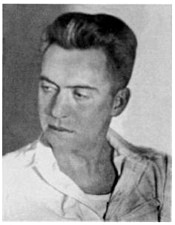
Hart Crane
(1889 – 1932)
My Grandmother’s Love Letters
There are no stars to-night
But those of memory.
Yet how much room for memory there is
In the loose girdle of soft rain.
There is even room enough
For the letters of my mother’s mother,
Elizabeth,
That have been pressed so long
Into a corner of the roof
That they are brown and soft,
And liable to melt as snow.
Over the greatness of such space
Steps must be gentle.
It is all hung by an invisible white hair.
It trembles as birch limbs webbing the air.
And I ask myself:
“Are your fingers long enough to play
Old keys that are but echoes:
Is the silence strong enough
To carry back the music to its source
And back to you again
As though to her?”
Yet I would lead my grandmother by the hand
Through much of what she would not understand;
And so I stumble. And the rain continues on the roof
With such a sound of gently pitying laughter.
Hart Crane poetry
fleursdumal.nl magazine
More in: Archive C-D, Crane, Hart
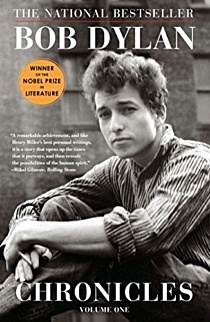
Bob Dylan won the Nobel Prize in Literature 2016
Bob Dylan born: 24 May 1941, Duluth, MN, USA – Nobel Prize motivation: “for having created new poetic expressions within the great American song tradition” – Bob Dylan (not present at the ceremony) writes Nobel prize speech & Patti Smith will perform Dylan’s “A Hard Rain’s A-Gonna Fall” on the Nobel banquet on Dec 10, 2016
Bob Dylan’s Albums
Bob Dylan (1962)
The Freewheelin’ Bob Dylan (1963)
The Times They Are A-Changin’ (1964)
Another Side Of Bob Dylan (1964)
Bringing It All Back Home (1965)
Highway 61 Revisited (1965)
Blonde On Blonde (1966)
Bob Dylan’s Greatest Hits (1967)
John Wesley Harding (1968)
Nashville Skyline (1969)
Self Portrait (1970)
New Morning (1970)
Bob Dylan’s Greatest Hits Vol. 2 (1971)
Pat Garrett & Billy The Kid (1973)
Dylan (1973)
Planet Waves (1974)
Before The Flood (1974)
Blood On The Tracks (1975)
The Basement Tapes (1975)
Desire (1976)
Hard Rain (1976)
Street Legal (1978)
Bob Dylan At Budokan (1978)
Slow Train Coming (1979)
Saved (1980)
Shot Of Love (1981)
Infidels (1983)
Real Live (1984)
Empire Burlesque (1985)
Biograph (1985)
Knocked Out Loaded (1986)
Down In The Groove (1988)
Dylan & The Dead (1989)
Oh Mercy (1989)
Under The Red Sky (1990)
The Bootleg Series Vols. 1-3: Rare And Unreleased 1961-1991 (1991)
Good As I Been to You (1992)
World Gone Wrong (1993)
Bob Dylan’s Greatest Hits Vol. 3 (1994)
MTV Unplugged (1995)
The Best Of Bob Dylan (1997)
The Songs Of Jimmie Rodgers: A Tribute (1997)
Time Out Of Mind (1997)
The Bootleg Series, Vol. 4: Bob Dylan Live 1966: The ’Royal Albert Hall’ Concert (1998)
The Essential Bob Dylan (2000)
”Love And Theft” (2001)
The Bootleg Series, Vol. 5: Live 1975: The Rolling Thunder Revue (2002)
Masked And Anonymous: The Soundtrack (2003)
Gotta Serve Somebody: The Gospel Songs Of Bob Dylan (2003)
The Bootleg Series, Vol. 6: Live 1964: Concert At Philharmonic Hall (2004)
The Bootleg Series, Vol. 7: No Direction Home: The Soundtrack (2005)
Live At The Gaslight 1962 (2005)
Live At Carnegie Hall 1963 (2005)
Modern Times (2006)
The Traveling Wilburys Collection (2007)
The Bootleg Series, Vol. 8: Tell Tale Signs: Rare And Unreleased, 1989-2006 (2008)
Together Through Life (2009)
Christmas In The Heart (2009)
The Original Mono Recordings (2010)
The Bootleg Series, Vol. 9: The Witmark Demos: 1962-1964 (2010)
Good Rockin’ Tonight: The Legacy Of Sun (2011)
Timeless (2011)
Tempest (2012)
The Lost Notebooks Of Hank Williams (2011)
The Bootleg Series, Vol. 10: Another Self Portrait (2013)
The Bootleg Series, Vol. 11: The Basement Tapes Complete (2014)
The Bootleg Series, Vol. 12: The Cutting Edge 1965-1966 (2015)
Shadows In The Night (2015)
Fallen Angels (2016)
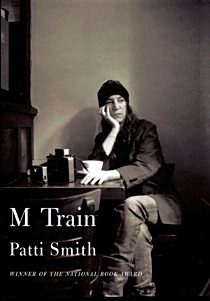 Nobel Prizes in Literature since 2000
Nobel Prizes in Literature since 2000
2016, Bob Dylan “for having created new poetic expressions within the great American song tradition”
2015, Svetlana Alexievich “for her polyphonic writings, a monument to suffering and courage in our time”
2014, Patrick Modiano “for the art of memory with which he has evoked the most ungraspable human destinies and uncovered the life-world of the occupation”
2013, Alice Munro “master of the contemporary short story”
2012, Mo Yan “who with hallucinatory realism merges folk tales, history and the contemporary”
2011, Tomas Tranströmer “because, through his condensed, translucent images, he gives us fresh access to reality”
2010, Mario Vargas Llosa “for his cartography of structures of power and his trenchant images of the individual’s resistance, revolt, and defeat”
2009, Herta Müller “who, with the concentration of poetry and the frankness of prose, depicts the landscape of the dispossessed”
2008, Jean-Marie Gustave Le Clézio “author of new departures, poetic adventure and sensual ecstasy, explorer of a humanity beyond and below the reigning civilization”
2007, Doris Lessing “that epicist of the female experience, who with scepticism, fire and visionary power has subjected a divided civilisation to scrutiny”
2006, Orhan Pamuk “who in the quest for the melancholic soul of his native city has discovered new symbols for the clash and interlacing of cultures”
2005, Harold Pinter “who in his plays uncovers the precipice under everyday prattle and forces entry into oppression’s closed rooms”
2004, Elfriede Jelinek “for her musical flow of voices and counter-voices in novels and plays that with extraordinary linguistic zeal reveal the absurdity of society’s clichés and their subjugating power”
2003, John M. Coetzee “who in innumerable guises portrays the surprising involvement of the outsider”
2002, Imre Kertész “for writing that upholds the fragile experience of the individual against the barbaric arbitrariness of history”
2001, Sir Vidiadhar Surajprasad Naipaul “for having united perceptive narrative and incorruptible scrutiny in works that compel us to see the presence of suppressed histories”
2000, Gao Xingjian “for an æuvre of universal validity, bitter insights and linguistic ingenuity, which has opened new paths for the Chinese novel and drama”
fleursdumal.nl magazine
More in: #Archive A-Z Sound Poetry, Archive C-D, Archive S-T, Art & Literature News, Bob Dylan, Dylan, Bob, Patti Smith, Smith, Patti, THEATRE
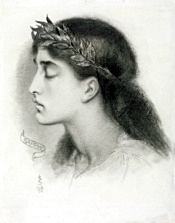
Felicia Hemans
The last song of Sappho
Sound on, thou dark unslumbering sea!
My dirge is in thy moan;
My spirit finds response in thee,
To its own ceaseless cry–’Alone, alone !’
Yet send me back one other word,
Ye tones that never cease !
Oh ! let your secret caves be stirr’d,
And say, dark waters! will ye give me peace?
Away! my weary soul hath sought
In vain one echoing sigh,
One answer to consuming thought
In human hearts–and will the wave reply ?
Sound on, thou dark, unslumbering sea!
Sound in thy scorn and pride !
I ask not, alien world, from thee,
What my own kindred earth hath still denied.
And yet I loved that earth so well,
With all its lovely things!
–Was it for this the death-wind fell
On my rich lyre, and quench’d its living strings?
–Let them lie silent at my feet !
Since broken even as they,
The heart whose music made them sweet,
Hath pour’d on desert-sands its wealth away.
Yet glory’s light hath touch’d my name,
The laurel-wreath is mine–
–With a lone heart, a weary frame–
O restless deep ! I come to make them thine !
Give to that crown, that burning crown,
Place in thy darkest hold!
Bury my anguish, my renown,
With hidden wrecks, lost gems, and wasted gold.
Thou sea-bird on the billow’s crest,
Thou hast thy love, thy home;
They wait thee in the quiet nest,
And I, the unsought, unwatch’d-for–I too come!
I, with this winged nature fraught,
These visions wildly free,
This boundless love, this fiery thought–
Alone I come–oh ! give me peace, dark sea!
Felicia Hemans (1793 – 1835)
The last song of Sappho
fleursdumal.nl magazine
More in: Archive G-H, Archive S-T, CLASSIC POETRY, Sappho
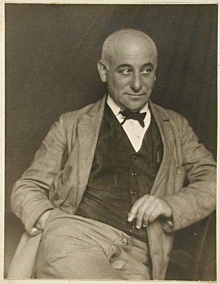
Max Jacob
(1876 – 1944)
Contes
Je me suis trompé d’étage
et de soirée mondaine.
Bah ! ce sera la même chose,
les gens se ressemblent,
l’appartement,
les meubles et le buffet.
Mais non ! ce sont des étrangers!
Vous croyez?
L’escalier!
on monte!
on redescend!
il est tard.
La soirée a bien changé d’aspect!
à l’autre étage aussi.
Au bord d’une herbe tendre
Je les ai vus passer
Et que faut-il comprendre
A les voir enlacés?
C’était un polyglotte
Du nom de
Rustifan
Et avait une grotte
Avec ses partisans.
Elle aime les dolmans.
J’aime les
Allemandes.
Nous aurons des enfants
Si
Dieu nous en demande.
Nous aurons des enfants
Faits par la propagande.
Nous aurons des enfants
Au linge damassé.
Max Jacob poetry
fleursdumal.nl magazine
More in: Archive I-J, Jacob, Max
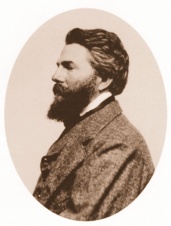
Herman Melville
(1819 – 1891)
Gold
We rovers bold,
To the land of Gold,
Over the bowling billows are gliding:
Eager to toil,
For the golden spoil,
And every hardship biding.
See! See!
Before our prows’ resistless dashes
The gold-fish fly in golden flashes!
‘Neath a sun of gold,
We rovers bold,
On the golden land are gaining;
And every night,
We steer aright,
By golden stars unwaning!
All fires burn a golden glare:
No locks so bright as golden hair!
All orange groves have golden gushings;
All mornings dawn with golden flushings!
In a shower of gold, say fables old,
A maiden was won by the god of gold!
In golden goblets wine is beaming:
On golden couches kings are dreaming!
The Golden Rule dries many tears!
The Golden Number rules the spheres!
Gold, gold it is, that sways the nations:
Gold! gold! the center of all rotations!
On golden axles worlds are turning:
With phosphorescence seas are burning!
All fire-flies flame with golden gleamings!
Gold-hunters’ hearts with golden dreamings!
With golden arrows kings are slain:
With gold we’ll buy a freeman’s name!
In toilsome trades, for scanty earnings,
At home we’ve slaved, with stifled yearnings:
No light! no hope! Oh, heavy woe!
When nights fled fast, and days dragged slow.
But joyful now, with eager eye,
Fast to the Promised Land we fly:
Where in deep mines,
The treasure shines;
Or down in beds of golden streams,
The gold-flakes glance in golden gleams!
How we long to sift,
That yellow drift!
Rivers! Rivers! cease your goings!
Sand-bars! rise, and stay the tide!
‘Till we’ve gained the golden flowing;
And in the golden haven ride!
Herman Melville poetry
fleursdumal.nl magazine
More in: Archive M-N, Herman Melville
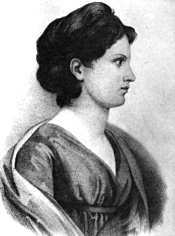
Karoline von Günderrode
(1780 – 1806)
Tendenz des Künstlers
Sage! was treibt doch den Künstler, sein Ideal aus dem Lande
Der Ideen zu ziehn, und es dem Stoff zu vertraun?
Schöner wird ihm sein Bilden gelingen im Reich der Gedanken,
Wäre es flüchtiger zwar, dennoch auch freier dafür,
Und sein Eigenthum mehr, und nicht dem Stoff unterthänig.
Frager! der du so fragst, du verstehst nicht des Geistes Beginnen,
Siehst nicht was er erstrebt, nicht was der Künstler ersehnt.
Alle! sie wollen unsterbliches thun, die sterblichen Menschen.
Leben im Himmel die Frommen, in guten Thaten die Guten,
Bleibend will sein der Künstler im Reiche der Schönheit,
Darum in dauernder Form stellt den Gedanken er dar.
Karoline Günderrode Gedichte
fleursdumal.nl magazine
More in: Archive G-H, Karoline von Günderrode
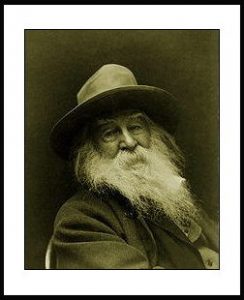
Walt Whitman
(1819 – 1892)
“So Long!”
1
To conclude–I announce what comes after me;
I announce mightier offspring, orators, days, and then depart,
I remember I said, before my leaves sprang at all,
I would raise my voice jocund and strong, with reference to consummations.
When America does what was promised,
When there are plentiful athletic bards, inland and sea-board,
When through these States walk a hundred millions of superb persons,
When the rest part away for superb persons, and contribute to them,
When breeds of the most perfect mothers denote America,
Then to me my due fruition.
I have pressed through in my own right,
I have offered my style to every one–I have journeyed with confident step.
While my pleasure is yet at the full, I whisper, ” So long!”
And take the young woman’s hand, and the young man’s hand for the last
time.
2
I announce natural persons to arise,
I announce justice triumphant,
I announce uncompromising liberty and equality,
I announce the justification of candour, and the justification of pride.
I announce that the identity of these States is a single identity only,
I announce the Union, out of all its struggles and wars, more and more
compact,
I announce splendours and majesties to make all the previous politics of
the earth insignificant.
I announce a man or woman coming–perhaps you are the one (“So long!”)
I announce the great individual, fluid as Nature, chaste, affectionate,
compassionate, fully armed.
I announce a life that shall be copious, vehement, spiritual, bold,
And I announce an old age that shall lightly and joyfully meet its
translation.
3
O thicker and faster! (“So long!”)
O crowding too close upon me;
I foresee too much–it means more than I thought,
It appears to me I am dying.
Hasten throat, and sound your last!
Salute me–salute the days once more. Peal the old cry once more.
Screaming electric, the atmosphere using,
At random glancing, each as I notice absorbing,
Swiftly on, but a little while alighting,
Curious enveloped messages delivering,
Sparkles hot, seed ethereal, down in the dirt dropping,
Myself unknowing, my commission obeying, to question it never daring,
To ages, and ages yet, the growth of the seed leaving,
To troops out of me rising–they the tasks I have set promulging,
To women certain whispers of myself bequeathing–their affection me more
clearly explaining,
To young men my problems offering–no dallier I–I the muscle of their
brains trying,
So I pass–a little time vocal, visible, contrary,
Afterward, a melodious echo, passionately bent for–death making me really
undying,–
The best of me then when no longer visible–for toward that I have been
incessantly preparing.
What is there more, that I lag and pause, and crouch extended with unshut
mouth?
Is there a single final farewell?
4
My songs cease–I abandon them,
From behind the screen where I hid, I advance personally, solely to you.
Camerado! This is no book;
Who touches this touches a man.
(Is it night? Are we here alone?)
It is I you hold, and who holds you,
I spring from the pages into your arms–decease calls me forth.
O how your fingers drowse me!
Your breath falls around me like dew–your pulse lulls the tympans of my
ears,
I feel immerged from head to foot,
Delicious–enough.
Enough, O deed impromptu and secret!
Enough, O gliding present! Enough, O summed-up past!
5
Dear friend, whoever you are, here, take this kiss,
I give it especially to you–Do not forget me,
I feel like one who has done his work–I progress on,–(long enough have I
dallied with Life,)
The unknown sphere, more real than I dreamed, more direct, awakening rays
about me–“So long!”
Remember my words–I love you–I depart from materials,
I am as one disembodied, triumphant, dead.
Walt Whitman poetry
fleursdumal.nl magazine
More in: Archive W-X, Whitman, Walt

William Shakespeare
(1564-1616)
Now is the winter of our discontent
Now is the winter of our discontent
Made glorious summer by this sun of York,
And all the clouds that loured upon our house
In the deep bosom of the ocean buried.
Now are our brows bound with victorious wreaths,
Our bruised arms hung up for monuments,
Our stern alarums changed to merry meetings,
Our dreadful marches to delightful measures.
Grim-visaged war hath smoothed his wrinkled front;
And now, instead of mounting barbed steeds
To fright the souls of fearful adversaries,
He capers nimbly in a lady’s chamber
To the lascivious pleasing of a lute.
But I, that am not shaped for sportive tricks,
Nor made to court an amorous looking-glass;
I, that am rudely stamped, and want love’s majesty
To strut before a wanton ambling nymph;
I, that am curtailed of this fair proportion,
Cheated of feature by dissembling nature,
Deformed, unfinished, sent before my time
Into this breathing world, scarce half made up,
And that so lamely and unfashionable
That dogs bark at me as I halt by them,–
Why, I, in this weak piping time of peace,
Have no delight to pass away the time,
Unless to spy my shadow in the sun.
William Shakespeare, “King Richard III”, Act 1 scene 1
Shakespeare 400 (1616 – 2016)
fleursdumal.nl magazine
More in: 4SEASONS#Winter, Archive S-T, Shakespeare, William
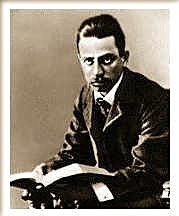
Rainer Maria Rilke
(1875 – 1926)
Die Kathedrale
In jenen kleinen Städten, wo herum
die alten Häuser wie ein Jahrmarkt hocken
der sie bemerkt hat plötzlich und, erschrocken,
die Buden zumacht und, ganz zu und stumm,
die Schreier still, die Trommel angehalten,
zu ihr hinaufhorcht aufgeregten Ohrs –
dieweil sie ruhig immer in dem alten
Faltenmantel ihrer Contreforts
dasteht und von den Häusern gar nicht weiß:
in jenen kleinen Städten kannst du sehn,
wie sehr entwachsen ihrem Umgangskreis
die Kathedralen waren. Ihr Erstehn
ging über alles fort, so wie den Blick
des eignen Lebens viel zu große Nähe
fortwährend übersteigt, und als geschähe
nichts anderes; als wäre Das Geschick,
was sich in ihnen aufhäuft ohne Maßen,
versteinert und zum Dauernden bestimmt,
nicht Das, was unten in den dunkeln Straßen
vom Zufall irgendwelche Namen nimmt
und darin geht, wie Kinder Grün und Rot
und was der Krämer hat als Schürze tragen.
Da war Geburt in diesen Unterlagen,
und Kraft und Andrang war in diesem Ragen
und Liebe überall wie Wein und Brot,
und die Portale voller Liebesklagen.
Das Leben zögerte im Stundenschlagen,
und in den Türmen, welche voll Entsagen
auf einmal nicht mehr stiegen, war der Tod.
Rainer Maria Rilke Gedichte
fleursdumal.nl magazine
More in: Archive Q-R, Rilke, Rainer Maria
Thank you for reading Fleurs du Mal - magazine for art & literature